Here’s How a Haryana Mom Turned One Hand-Knitted Frock Into a Multi-Crore Startup
In the past year, Ajoobaa has had an annual turnover of Rs. 1.4 crore regardless of managing their operations on a small scale.
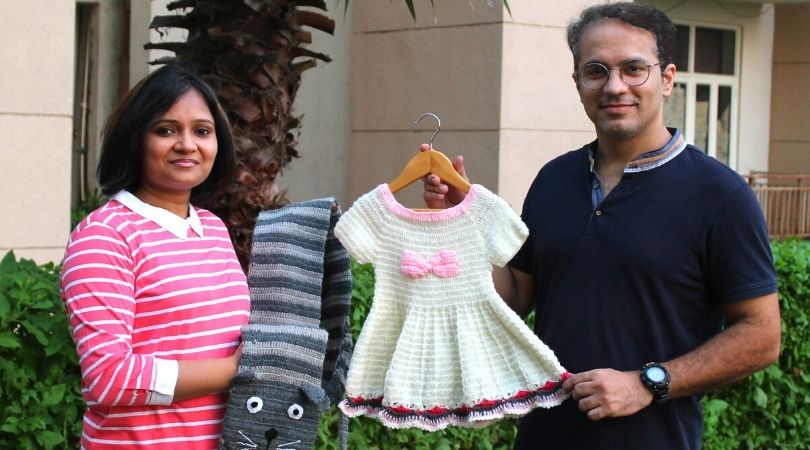
One of the fondest memories from my childhood was sitting next to my grandmothers and learning how to knit and crochet. My grandmothers would gently direct me about the nuanced twists and turns of the yarn and the threads that one was working with. In the end, the result would be a beautiful muffler, a sweater, or a handkerchief with beautiful lace.
Over the course of time, these handcrafted pieces began to disappear and were replaced by machine-made mass-produced goods, which I always found to be a loss.
Entrepreneur Tarishi Jain seems to feel the same and is definitely someone who would choose handmade items over anything else.
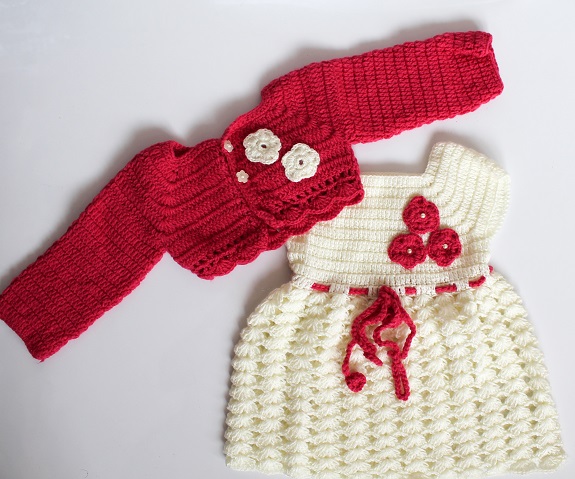
In 2015, when she was pregnant with her daughter, her mother-in-law knitted a beautiful frock which she was completely taken by. Skilled in knitting and crocheting during her school days, she decided to take it up again.
“I had always loved engaging in these activities but had lost touch over time. Seeing the beautiful frock, I was taken back to the time when I crocheted and made beautiful tv covers, handkerchiefs, and laces. So, I decided to try my hand at it again and in two days, I too had made a beautiful frock for my daughter,” recalls the 34-year-old.
Over time, these beautiful handcrafted items started being noticed by her friends and acquaintances who would request her to knit items for their infants. The demand only grew – which pushed Tarishi towards identifying more people who knew the art of knitting and crocheting. She also felt that by starting a venture, she could support several women who could work from the comfort of their homes.
This is what led to the birth of ‘Ajoobaa’ in 2018. Ajoobaa is a startup that sells handmade wool crochet and knitted wear that is available for children up to four years. The startup is based out of Sonipat in Haryana where the operations are carried out actively. After Tarishi founded the startup, her husband Nivesh too quit his job and started looking after the operations at Ajoobaa.
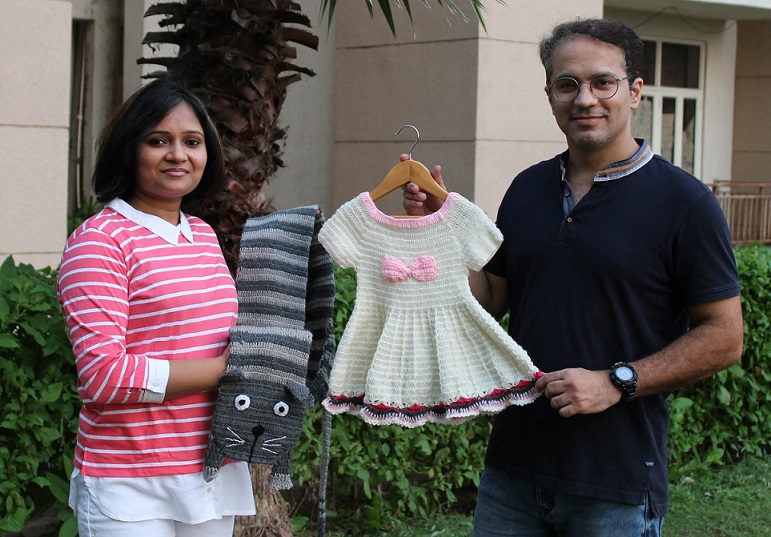
Now, almost over four years later, Ajoobaa gets about 4,000 orders in a month! The startup, in the last one year, has dressed at least 20,000 children. They are currently working with 112 artisans, mostly homemakers who make these beautiful products by hand. In the past year, Ajoobaa has had an annual turnover of Rs 1.4 Crore despite managing their operations on a small scale.
In conversation with The Better India (TBI), Tarishi and Nivesh talk about how they helped grow the business which had roots in humble beginnings.
How it all began
Starting a children’s apparel business was not a pre-conceived plan but something that took its own course. Tarishi finished her Bachelor’s in Architecture degree from the Government College of Lucknow in 2009. Soon, she applied for a Master’s degree in building engineering and management (MBEM) from the School of Planning and Architecture, New Delhi and passed out in 2011.
Tarishi then joined Larsen and Turbo as a senior architect and quit her job when she got married in 2013. She moved to Jaipur with her husband Nivesh and worked with a local architecture firm for two years.
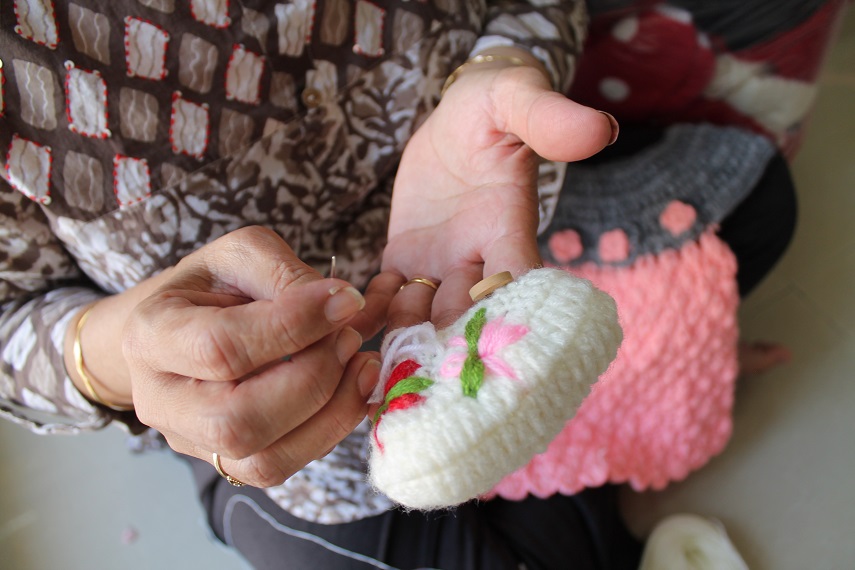
Interestingly, Tarishi and Nivesh were both school mates before they turned business partners. Nivesh is an Electronics and Communications Engineering graduate from Jagadguru Sri Shivarathreeshwara (JSS) Academy of Technical Education based in Noida. He then decided to pursue an MBA degree from Narsee Monjee in Mumbai.
After passing put with the degree in 2011, he joined DHL Express as a warehouse and project manager working with them until June 2018. In July, he joined Amazon as an Operations Manager and moved to Sonipat.
Once the couple moved to Sonipat, that is when the real operations really began and the startup too was formally constituted in the same year. Before that, most of the operations were being carried out informally at a smaller scale.
“I began by asking my house-help if she knew any women who were skilled in knitting and crochet work. She was happy to put me in touch with these women. I would share a design sample with them and they were able to replicate it beautifully. This helped me keep faith in the fact that this is in fact be a successful business,” informs Tarishi.
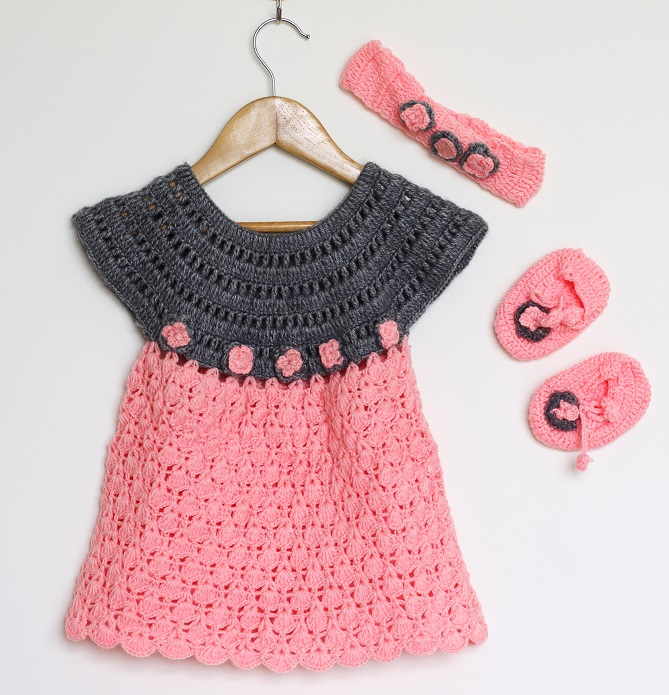
Most of the orders were taken through Instagram and the customer base grew through word of mouth.
Growing one step at a time
When it comes to work allocation, the tasks are neatly divided between the couple. Tarishi works closely with the artisans, the designs, inventory management, packaging of orders and even clicking pictures of the products that go on the website. On the other hand, Nivesh looks at the procurement of raw materials, production, marketing and business development, and exploring new marketplace opportunities.
Nivesh informs that they only launched the online website for Ajoobaa last year in November. So, the majority of their sales take place through Whatsapp, social media platforms, their own website along with online e-commerce websites like First Cry, Amazon, Flipkart, Hopscotch and will be soon available on Myntra.
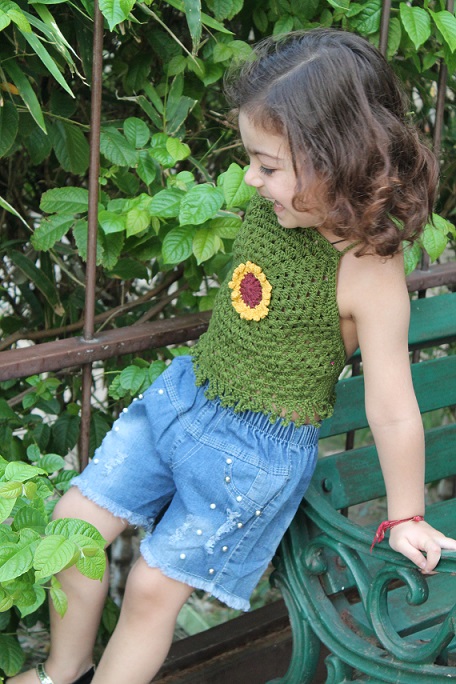
“Although the artisans work from the comfort of their homes, we still have a 1400 sq feet collection centre where all the finished products are consolidated and carefully sorted. In the case of the raw materials, the wool is sourced from vendors in Ludhiana and is provided to the artisans along with buttons, threads, and other embellishments,” informs Tarishi.
Currently, there are frocks of over 250+ designs, 100 sweaters designs, over 150 different kinds of booties, and approx 100 different kinds of caps. Additionally, they also have mufflers and accessories like hair clips, hairbands, ear muffs, and leg warmers. All the products are priced between Rs. 125 to Rs. 1500 which is considerably affordable and this is what attracted a lot of customers.
Kochi based homemaker Monika Kaushik is one such customer who fell in love with Ajoobaa’s affordable range of woollens for children. The 28-year-old new mom began looking for woollens for her daughter as they planning to visit their family in Delhi before the pandemic hit. Regardless, Monika was more than impressed with the knitwear she bought for her infant through Ajoobaa.
“I ordered this really cute frock set which comprises a frock, yellow booties and a black cap. I also ordered a pair of white booties with yellow flowers. I love the fact that the products are reasonably priced without any kind of compromise on quality. I liked it so much that have even recommended the brand to my friends,” she says.
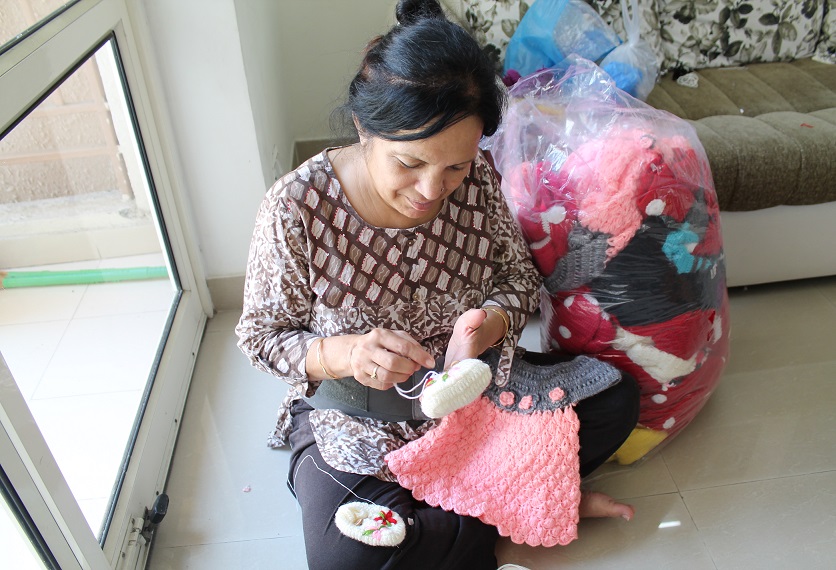
But if you were to ask the co-founders about what they are most proud about, Nivesh emphasizes that they are proud to be supporting the livelihood of so many women.
“Our network of artisans is based out of pockets in Sonipat. To make the operations smoother, we have a head artisan in each cluster who can oversee the work of others who have now joined our network,” says Nivesh.
Sixty-year-old Jaidevi is a head artisan working with Ajoobaa who manages a group of 25 artisans. The homemaker learned how to knit and crochet from her mother-in-law. Over time and after her husband passed away, she shares that she lost touch with knitting and crocheting. Her three sons also grew up and got married but Jaidevi found it extremely difficult to pass time without doing anything.
So, when Ajoobaa’s team started hunting for artisans who could work with them, Jaidevi was more than obliged.
“They asked me to replicate some samples and were really happy with what I produced. I have been working with them for over a year now. The best part is I work only three to four hours in a depending on my convenience and also earn for it,” shares Jaidevi with a smile.
Overcoming hurdles and moving forward
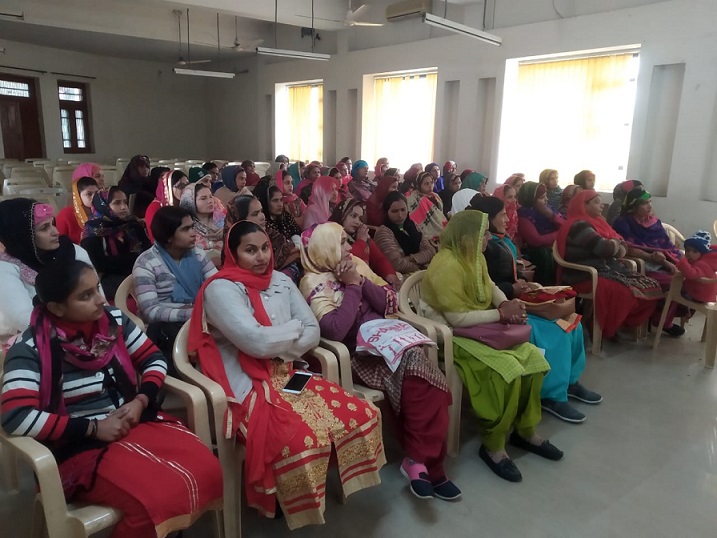
Although Tarishi and Nivesh have been able to win customers over with their affordable range and beautifully designed children’s knitwear, the journey has been anything but a bed of roses.
“I think the biggest challenge was the fact that neither Tarishi nor I had any kind of experience in the field of textiles, clothing, or fashion. But, we were able to manage that slowly and steadily. Also, another challenge is the fact that since all our products are handmade, standardisation is difficult with each piece. But, I also feel that is the beauty of anything that is handmade,” states Nivesh.
Another challenge that he tells us about the slow cashflow. Since they are still a bootstrapped startup and all products are handmade, the operations are currently at a slower pace than the demand that is evergrowing. But then again, Nivesh says that he isn’t too worried because they plan on scaling up the business in the next few months.
On the other hand, through their own learning experiences and overcoming hurdles, Tarishi has a few words of encouragement for other entrepreneurs.
“Always keep experimenting and you may never know a small idea can lead to something great. Never lose hope and just keep working hard, everything else will follow,” she says.
So, what lay ahead for the Sonipat based startup?
Nivesh shares that they want to set up a collection centre in the eastern part of Uttar Pradesh as well to onboard more artisans and also meet the current demand. In the future, he shares that they want to go beyond children’s wear and come up with a range of women’s wear and also want to venture into interior decor.
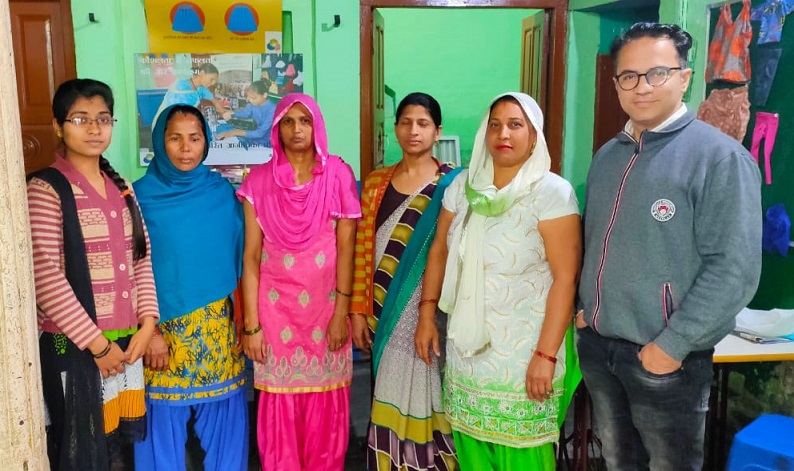
The duo also shares that they are eager to start exporting abroad eventually when they grow because they feel that cold countries like Canada and others in Europe will be a great market for them to explore.
“We hope that we create a network of skilled artisans who can work with us. Most people who do sell woollens, use machines to produce in bulk. But, what we want to do is show the beauty of products from India that are handmade. The ultimate goal for us would be to become a one-stop-shop for all things handmade,” says Nivesh signing off.
(Edited by Vinayak Hegde)
Like this story? Or have something to share?
Write to us: [email protected]
Connect with us on Facebook and Twitter.
If you found our stories insightful, informative, or even just enjoyable, we invite you to consider making a voluntary payment to support the work we do at The Better India. Your contribution helps us continue producing quality content that educates, inspires, and drives positive change.
Choose one of the payment options below for your contribution-
By paying for the stories you value, you directly contribute to sustaining our efforts focused on making a difference in the world. Together, let’s ensure that impactful stories continue to be told and shared, enriching lives and communities alike.
Thank you for your support. Here are some frequently asked questions you might find helpful to know why you are contributing?


This story made me
-
97
-
121
-
89
-
167











